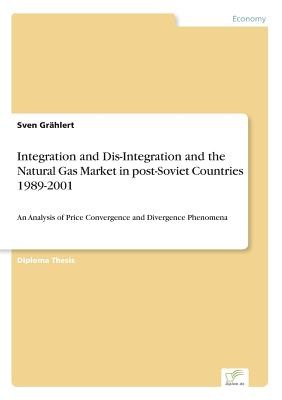
- We will send in 10–14 business days.
- Author: Sven Grählert
- Publisher: Diplom.de
- Year: 2006
- Pages: 84
- ISBN-10: 3838694821
- ISBN-13: 9783838694825
- Format: 14.8 x 21 x 0.5 cm, minkšti viršeliai
- Language: English
- SAVE -10% with code: EXTRA
Integration and Dis-Integration and the Natural Gas Market in post-Soviet Countries 1989-2001 (e-book) (used book) | bookbook.eu
Reviews
Description
Inhaltsangabe: Abstract: Integration and Dis-Integration or Dis-Integration and Integration or Dis-Integration and Re-Integration can be quite a word play. The Dis-Integration of the former Soviet Union (FSU) in the early 1990s marks a serious and unprecedented development in modern history. It was a break-up of the Union of Socialist Soviet Republics into fifteen newly independent states. Hereby, twelve states formed the Commonwealth of Independent States (CIS), a structure that was to keep some order over the break-up. Three countries - the Baltics - announced their total independence and declared no will to be part of the CIS. A later Integration or Re-Integration within the CIS is being actively discussed and debated up to now. Several theories have evolved on the future of the region. Huntington's thesis predicts the 'Clash of Civilizations'. He argues that the future battle over world politics will be over religious and cultural factors. Huntington predicts a split-up of the world along religious lines. In turn, Duncan rejects religion to be a factor in the current developments of the CIS. He limits Kuzio's idea of a division between the CIS into 'radicals' and 'pragmatists' among the two groups - the 'Westernizers' and 'Slavophiles'. Duncan concludes that there is generally a shift towards pragmatism in the foreign policies of the member states of the FSU. Disillusionment with the West is widespread. Most important factors that make countries tend towards a Westernist' or Eurasianist' course are linked to ethnicity and conflict. The author views the political regime and economic reforms are less important. Other studies focus more on the relationship between Russia and the other CIS countries. Alexandrova's arguments support the trend towards pragmatism. She adds that Moscow gave up the concept of re-integration, which it was convinced of in the first years of transition. Russia's foreign policy from Yeltsin to Putin shifted from Multilateralism to Bilatera
EXTRA 10 % discount with code: EXTRA
The promotion ends in 21d.09:04:12
The discount code is valid when purchasing from 10 €. Discounts do not stack.
- Author: Sven Grählert
- Publisher: Diplom.de
- Year: 2006
- Pages: 84
- ISBN-10: 3838694821
- ISBN-13: 9783838694825
- Format: 14.8 x 21 x 0.5 cm, minkšti viršeliai
- Language: English English
Inhaltsangabe: Abstract: Integration and Dis-Integration or Dis-Integration and Integration or Dis-Integration and Re-Integration can be quite a word play. The Dis-Integration of the former Soviet Union (FSU) in the early 1990s marks a serious and unprecedented development in modern history. It was a break-up of the Union of Socialist Soviet Republics into fifteen newly independent states. Hereby, twelve states formed the Commonwealth of Independent States (CIS), a structure that was to keep some order over the break-up. Three countries - the Baltics - announced their total independence and declared no will to be part of the CIS. A later Integration or Re-Integration within the CIS is being actively discussed and debated up to now. Several theories have evolved on the future of the region. Huntington's thesis predicts the 'Clash of Civilizations'. He argues that the future battle over world politics will be over religious and cultural factors. Huntington predicts a split-up of the world along religious lines. In turn, Duncan rejects religion to be a factor in the current developments of the CIS. He limits Kuzio's idea of a division between the CIS into 'radicals' and 'pragmatists' among the two groups - the 'Westernizers' and 'Slavophiles'. Duncan concludes that there is generally a shift towards pragmatism in the foreign policies of the member states of the FSU. Disillusionment with the West is widespread. Most important factors that make countries tend towards a Westernist' or Eurasianist' course are linked to ethnicity and conflict. The author views the political regime and economic reforms are less important. Other studies focus more on the relationship between Russia and the other CIS countries. Alexandrova's arguments support the trend towards pragmatism. She adds that Moscow gave up the concept of re-integration, which it was convinced of in the first years of transition. Russia's foreign policy from Yeltsin to Putin shifted from Multilateralism to Bilatera


Reviews